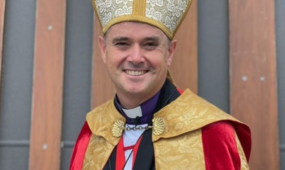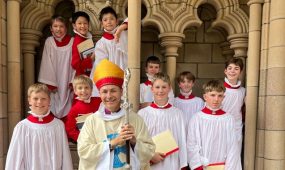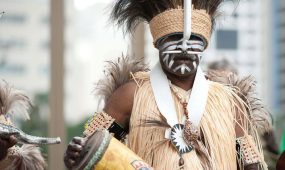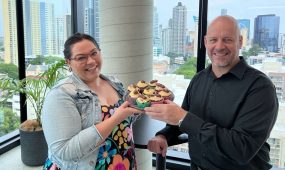Q&A with Anglicare SQ Cultural Capability Facilitator and Yiman woman, Olly Yasso
Spotlight Q&A
Meet Olly Yasso and find out what she has to say about Reconciliation and NAIDOC Week, what is was like to grow up on the Don River in North Queensland, and about her faith journey, where she does her best thinking and the highlights of her Anglicare Southern Queensland role so far
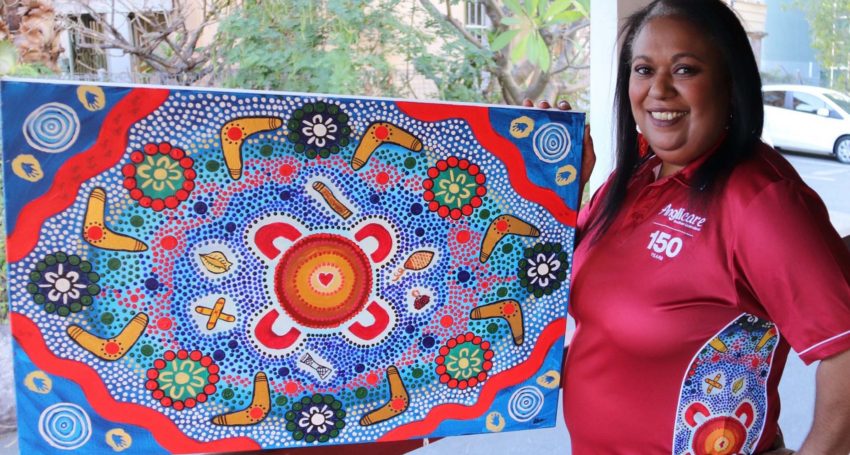
Please note: First Nations peoples should be aware that this content contains images and names of deceased persons.
Olly Yasso is of Aboriginal and Australian-born South Sea Islander (ASSI) heritage. Her people are from the Yiman Nation, which surround Taroom in Queensland, and Tanna Island, Vanuatu, on her ASSI side. Her father is Vern Yasso, also previously known as Vern Querro, and her mother is Elizabeth Yasso, née Power. She has one sister and two brothers, all older than her, and a daughter and a grandson. She has a very large family, as Olly’s mother was one of 13 children and her mother Olive Yasso was one of 11 children – and her family has lived in the Bowen region for many years. Her maternal grandmother was part of the stolen generations, and was taken away from her mother at a young age and raised in a non-Indigenous home.
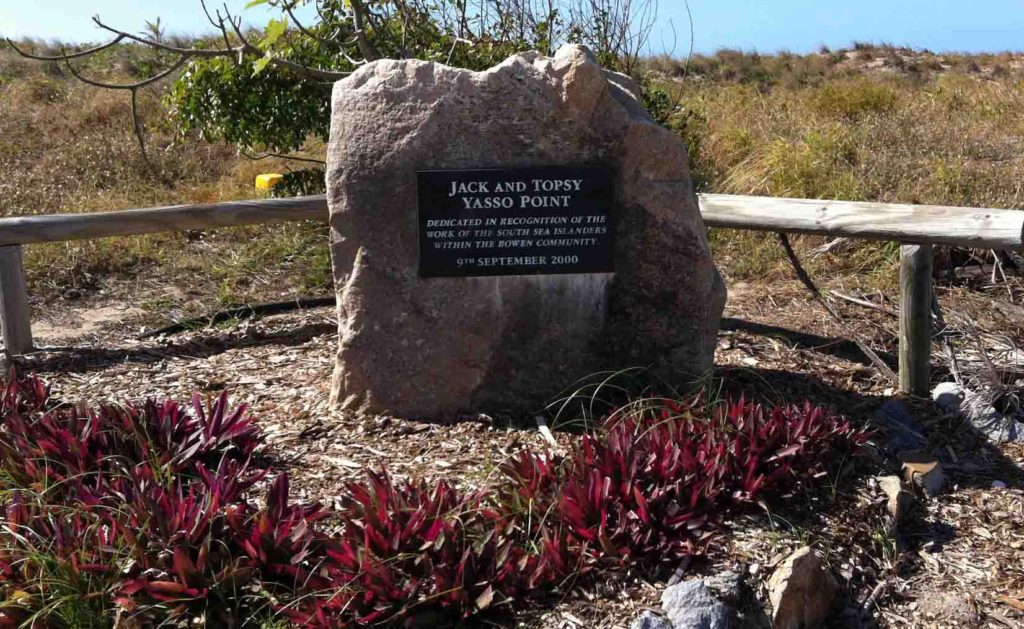
A plaque dedicated to Olly’s great-grandparents Jack and Topsy Yasso, and other South Sea Islanders, in Bowen
How long have you been working for Anglicare Southern Queensland and in what roles?
I have been working for Anglicare Southern Queensland for the past two and a half years. I commenced in the Cultural Capability Facilitator position in February 2018 at the Woolloongabba Service Centre. I moved to the Cathedral Precinct on Ann Street in late 2018 following a restructure and since January 2019 I have been working in the Organisational Development team.
What is your current role and what does your role involve?
‘Cultural Capability Facilitator (Indigenous)’ is my full role title and it involves developing strategies, such as our First Nations Cultural Capability Framework, and activities to strengthen the capability of Anglicare Southern Queensland to work effectively with and in collaboration with the first peoples of Australia. This includes developing strategic documents and resources and planning activities, as well as being a subject matter expert to staff and teams to support their work. We started the Reconciling Histories Project to capture our Reconciliation Journey. I work closely with Sandra King, the ACSQ’s Reconciliation Action Plan (RAP) Coordinator, and I am a member of the ACSQ RAP Working Group.
What projects and activities are you currently working on?
I have three key documents that are in various stages of development. The first is a Protocols Guide resource for staff, which is in the last stages of development and will be distributed soon. We are in the early stages of developing an Aboriginal and Torres Strait Islander Employment Strategy and the Cultural Capability Training Suite, which will be a number of modules available for staff to increase their cultural learnings. We are also hoping to do an official launch of the First Nations Cultural Capability Framework and are working towards NAIDOC Week events across the organisation.
What have been the highlights of your role so far?
The most recent highlight was getting to see my artwork on ‘Anglicare Southern Queensland’s 150 Years’ shirts and cars. At first it wasn’t a big deal – until I actually saw it all come to life when I got to see the cars with the artwork and people wearing their shirts. It was a weird feeling at first, but then I started to feel proud in not only my achievements, but those of the whole organisation.
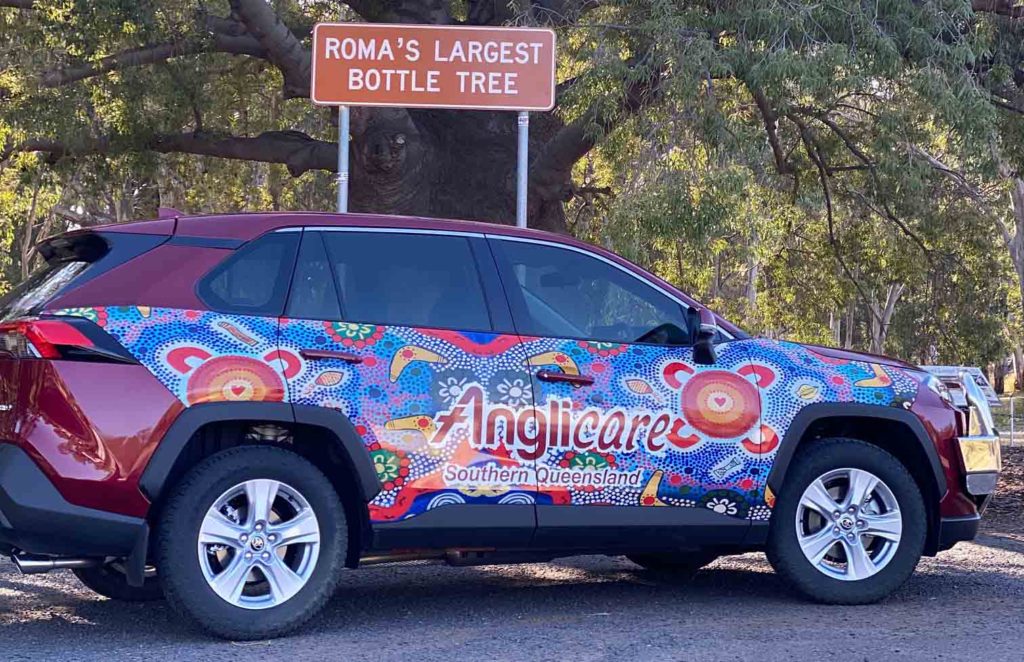
“The most recent highlight was getting to see my artwork on ‘Anglicare Southern Queensland’s 150 Years’ shirts and cars” (Olly Yasso)
What have been the key challenges of your roles so far and how have you worked through these?
Getting people to understand that our role isn’t to be the ‘saviours’ for our first peoples – that our role is to be the friend, the ally and the advocate. There is also sometimes a fear of engagement and this is understandable as some people have gone out with good intentions but had bad experiences. This should not be the reason to stop trying, as we should keep trying and be intentionally persistent.
Related Story
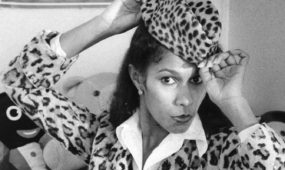 Features
Features
NAIDOC Week: being inspired by our First Nations peoples
Historically, First Nations peoples have had so many bad experiences with people coming in wanting to help or partner with their communities, only to be blindsided and forgotten when funding is received. This has resulted in increased mistrust and caution when non-Indigenous people and organisations come into Aboriginal and Torres Strait Islander communities to engage. This is why increasing your knowledge of Aboriginal and Torres Strait Islander cultures and histories and building relationships, especially at the local level, is a very important part of engagement.
Why is it important for Christians to engage in Reconciliation with First Nations peoples?
The God of the Bible loves all of humankind so much that He gave His only begotten son (John 3.16) as a sacrifice for our sins so that we can be reconciled to God for eternity. To be reconciled with God we must be reconciled with our brothers and sisters. Christians need to be among the leaders of Reconciliation, as they understand the significance of the sacrifice of the cross.
This year’s Diocesan theme is ‘Being Together: Practising Peacemaking’. What are some practical ways that we can implement peacemaking in the context of Reconciliation?
At the heart of the work I do is the coming together at a human to human level, getting to know and understand one another first. It is about just being there, being present, being humble – being there with a heart and desire to understand and establish relationships. This is the precursor to collaborating and walking together. If you can build a relationship with First Nations peoples and manage to build trust, you have just ‘practised peacemaking’ because while we can be wary of others, due to past and ongoing hurts, if you are invited into the inner fold than you have created an informal kind of peace treaty. Hold that sacred.
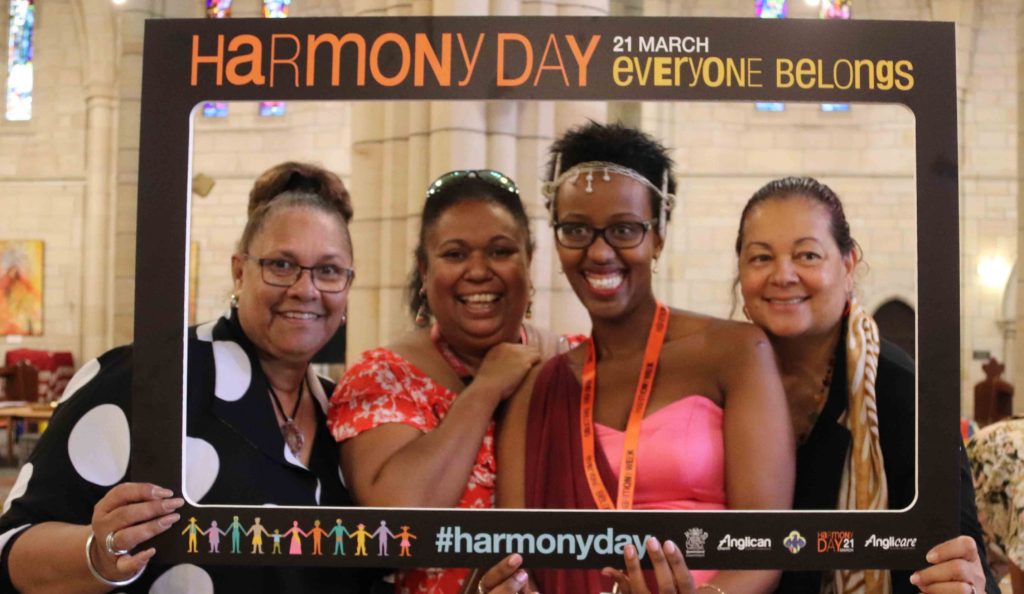
ACSQ RAP Coordinator Aunty Sandra King, Anglicare’s Olly Yasso, Anglicare’s Claire Uwimana and Jagera elder Aunty Kerry Charlton after a Harmony Day service in St John’s Cathedral
NAIDOC Week is coming up on 8-15 November – what does this specially dedicated week mean to you as a Yiman woman?
Growing up you were looked down upon for being Aboriginal, but this week was always our week – a week to march and advocate and to celebrate us as a people. It’s about being with mob.
Why is it important for Christians to mark NAIDOC Week?
We celebrate many occasions that are important to the Christian faith and welcome non-believers to join, and this is an opportunity for Christian people to ‘break bread’ and enjoy fellowship by joining with the first peoples of the land.
Can you tell us a little about your personal faith journey?
Every day I am strengthening my walk with God – I find it is a daily effort as I strive to fight the good fight, finish the race and keep the faith (2 Timothy 4.7). Every day is a battle with sin but I read the Word for the renewing of my mind (Romans 12.2), wait on God in prayer (Philippians 4.6-7) and allow God to transform me (2 Corinthians 4.16) from the inside out because I cannot do it without Him.
How does your faith inspire you and shape your outlook, life choices and character?
I try to choose love and forgiveness as often as I can. I’m not perfect, so I have my moments. I do this for myself mostly, but generally I am pretty accepting of everyone –you treat me respectfully and I will reciprocate.
What is your favourite scripture and why?
It is very hard to choose and I have mentioned a number of them already, but one scripture that helped me move from a shy, introverted person to someone with more confidence to speak out is the story of Moses and this scripture:
“But Moses said to the Lord, “O my Lord, I have never been eloquent, neither in the past nor even now that you have spoken to your servant; but I am slow of speech and slow of tongue.” Then the Lord said to him, “Who gives speech to mortals? Who makes them mute or deaf, seeing or blind? Is it not I, the Lord? Now go, and I will be with your mouth and teach you what you are to speak.” (Exodus 4.10-12)
What person of faith inspires you the most and why?
I think there are so many parallels between many of the people written about in the Bible from Abraham, Moses, Joshua, David, Esther, Ruth, Daniel, the Disciples, Paul and many more. Their stories show that the journey is not always smooth, but with Him you will overcome anything and you will have peace. This resonates with my own life and the stories of my family – they were treated so badly in their time but they never lost their faith or trust in God, even when it all seemed impossible, and God blessed them with abundance and wealth.
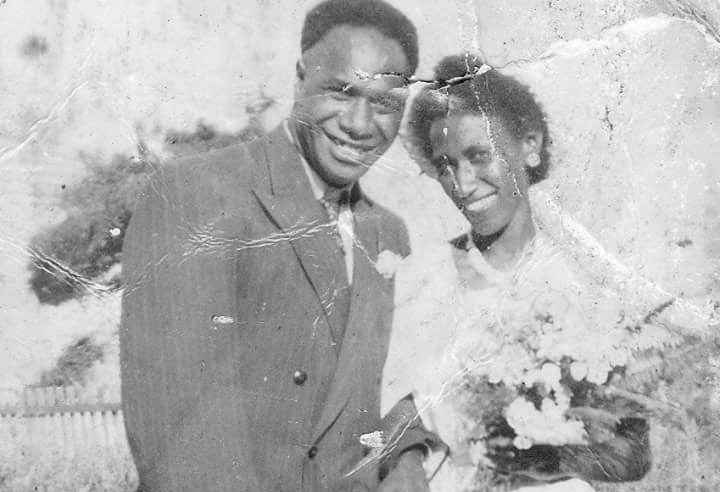
Olly’s grandparents, Edward and Esther, on their wedding day in 1954 in Bowen
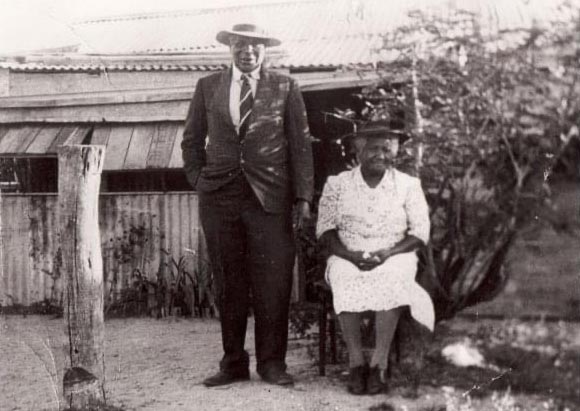
Olly’s great-grandparents, Jack and Topsy Yasso in Bowen
What are the primary strengths of the Church and what is the best way to make the most of these for the benefit of our communities?
I think the number one strength of the Church is the Gospel message. If you look at all the examples in the Bible of when people are being obedient to God and doing His will, no matter what came up against them, God sustained them to achieve God’s will. Jesus loves everyone and His desire is that we are all reconciled to Him eternally.
What are the primary challenges currently encountered by the Church and what is the best way to overcome these for the benefit of our communities?
I think the Christian Church has gotten somewhat comfortable behind the bricks and mortar of their buildings – not all, but many. The Church needs to genuinely reach out to people within their wider communities more.
What is the kindest gesture you have ever received or witnessed?
None can compare to the gift of forgiveness. I kept trying to think of one particular act of kindness that is of high significance and all I kept thinking about is the sacrifice Jesus made on the cross for us. You then forgive others because how can you not?
If you are having a bad day, what do you do to cheer yourself up?
If I can take time out, even for a minute, I try to calm or slow myself down. I tend to reflect on what is or has happened – most times I have no choice, as I don’t have any peace until I can come to some resolution. I then eventually, at some point, give it to God. Talking to someone always helps and because I use humour a lot to help get through the most challenging moments in my life, we end up laughing a lot and I feel so much better. Swimming is another great way to clear my head and feel better overall.
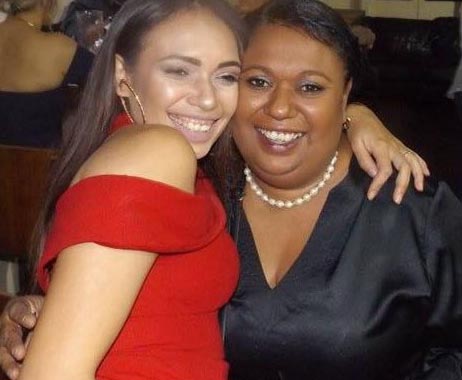
Olly and daughter India
What do you do in your free time to recharge and relax?
I sleep a lot in my free time these days while listening to podcasts, which I thoroughly enjoy. I used to play lots of different sports, such as touch football, volleyball, basketball, rugby union and rugby league, but now I mostly swim. I also enjoy spending time with my cheeky and energetic 14-month-old grandson and I love chilling with family and friends – just sitting yarning over some good food and music.
Where do you do your best thinking?
I do my best thinking in the morning and at night when I reflect on the day, what needs to be done and what was achieved. I think a lot when I am driving also – some say I think too much.
What’s your best childhood memory?
In Bowen we grew up at the mouth of the Don River and my grandfather’s yard had so many fruit and vegetables that you could just pick off the tree and eat. Every other house was a family member’s house and we spent most of our days with my cousins in the river or on the beach swimming, playing or fishing.
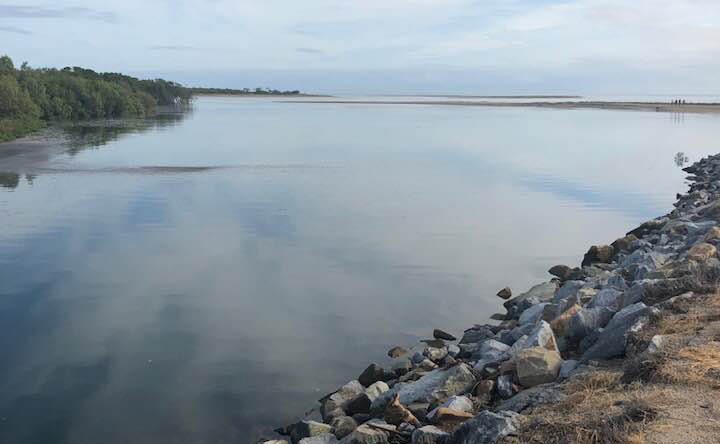
Yasso Point, Bowen
Our family every so often had themed gatherings and two really stood out to me. The first was an old western themed event where they built sets to make it look like an old western town that you see in the movies. The other gathering I remember the most was themed around our South Sea Islander heritage and we had long tables full of food, banana leaf tablecloths, pig on the spit, baskets of prawns and trays of fish beautifully garnished and presented, as well as hungi (kup murri, which is used to cook food under the ground). Not to mention the desserts.
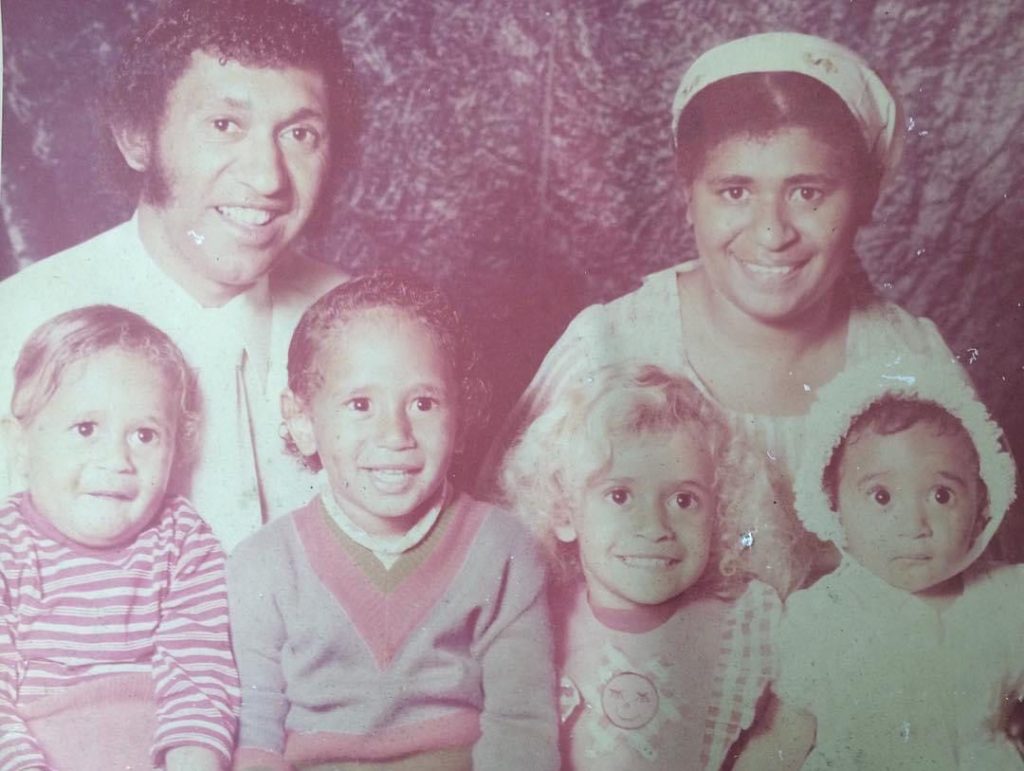
Olly’s family in 1976, with Olly far right

